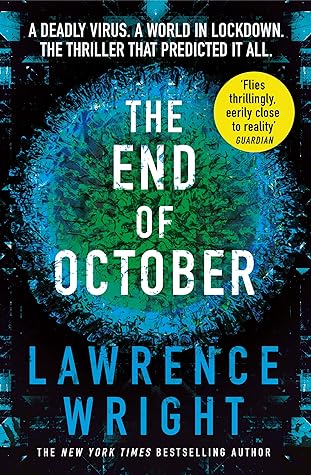More on this book
Community
Kindle Notes & Highlights
Science knows no borders, nor does disease—especially
Disease was more powerful than armies. Disease was more arbitrary than terrorism. Disease was crueler than human imagination.
The display counter was filled with cookies and cupcakes and fresh loaves of honeyed bread, a million beautiful calories begging for a home. The aroma itself was fattening, Jill thought. But rituals had to be observed.
They talked about everything. Normal happiness. Something that the two of them had made together.
Life naturally bent in her direction:
America didn’t have the money to be America anymore. Or the guts.
Ebola was a terrifying new phenomenon, but Pierre’s clarity and easy manner did much to calm the panic, which can be more contagious than the disease.
All the virtues—loyalty, patriotism, courage, honesty, faith, compassion, you name it—are just social constructs, patches to cover the naked barbarism that is at our core.
His dreams were a battlefield.
Carelessness was an underestimated threat to civilization.
“And then came oil, and we left the desert, but the desert didn’t leave us. It is inside us, this emptiness. It waits for us, as we sit in our palaces in the cities. The desert knows that one day the Arabians will return to her. She is a patient mother. But also a kind of monster. Everything will be taken away from us. One returns to the desert with nothing.”
Governments would fall. Economies would collapse. Wars would arise. Why did we think that our own modern era was immune to the assault of humanity’s most cunning and relentless enemy, the microbe?
It’s that whole thing about the Muslim flu. It’s just an excuse to keep them out of the country, but it also may help slow the progress of the disease.”
“We in this city will not be divided by fear,” she said. “Philadelphia is still and always will be the city of brotherly love. That is who we are. No matter what you read on the internet or who somebody wants to blame, our job is to love our brothers and sisters, to comfort them in this time of tribulation, to unite our community. Remain calm, open your hearts, aid the needy, and we will get through this together.”
Every new pandemic raised a question that had confounded medicine since the earliest days: Why were some people immune to novel diseases that otherwise run rampant through populations?
“There flashed upon my mind, unforeseen and unsought: Reverence for Life,”
Life, Jill thought, it’s majestic, it’s continuous, with or without us. And then she convulsed into sobs.
From the window of her condo on the waterfront, Tildy could see the empty wharfs, the river moving along indifferently, nature turning its back on humanity.
He had a theory that manageable doses of hardship would build immunity to the greater challenges that life would pose.
They returned the human gaze with equal curiosity. We are all animals here, they seemed to be saying.
So much could be destroyed so quickly, years of labor and unimaginable wealth instantly lost, and what would follow but decades of misery? The cost of war was never honestly tallied against the price of ordinary, strife-ridden peace.
My new religion, thought Helen: There is a God, and he hates us.
Under the assault of Kongoli, governments everywhere were dying. It wasn’t surprising when vulnerable governments fell, initially in Lebanon, Iraq, and Afghanistan, one after another, anarchy tracking the course of contagion, killing the strongest and pushing the weak aside.
Little was left of modernity except for weapons.
At least there were still firemen, so there was still government, so there was still civilization.
The internet was down. There was no television or radio. Only a few newspapers were able to print. Piece by piece, the bricks of modernity were being substracted.
The march of modernity stopped here.
civilization moves unevenly through millennia of progress only to undergo cycles of great destruction.
The slow and perhaps inexorable process of consuming human history was under way.
He moved around in a cloud of loss.
He had a foreboding that the ongoing war against disease would inevitably be lost. Humanity had enlisted the microbe as a weapon.
This is how the great crimes of history begin, Henry thought, with the perpetrators congratulating themselves.
“Well, doc, what are we going to tell history?” Cooksey asked. Henry looked up. The last flock of Siberian cranes had taken flight, headed for China. “We’re going to say that we did this to ourselves.”


